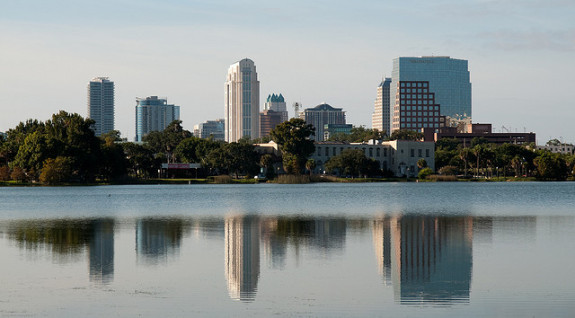
The Orlando metropolitan area has the lowest paid workers compared to other metro regions. (Photo by Jimmy Shag)
By Ashley Lopez
Florida Center for Investigative Reporting
A new report from The Orlando Sentinel shows the Orlando/Central Florida region is the lowest-paying major metropolitan area in the country, according to federal data analyzed by the newspaper’s staff.
Job creation has been a major focus of Gov. Rick Scott’s administration since he took office in 2010. However, the quality of the jobs created has taken a back seat in discussions of Florida’s economic future. Last year, a Georgetown University study claimed Florida was poised to become a state of mostly low-wage and/or low-skilled jobs.
Researchers noted that as the state saw jobless numbers decrease, a lot of the new jobs tended to be low-skilled jobs paying less than the jobs they replaced following the Great Recession.
The Sun Sentinel reported at the time that according to the Center for Economic and Policy Research, a “good job” in the United States is “defined as one that pays at least $18.50 an hour, or $37,000 a year, has employer-provided health insurance and a retirement plan.”
New research from The Orlando Sentinel, however, shows that many Floridians in the Orlando region do not have a “good job.” According to the Sentinel:
The analysis compared Orlando with Florida’s big metro areas, to cities of similar size across the country and to communities often mentioned as peers — places like Austin, Texas; Nashville, Tenn.; or Las Vegas. Central Florida’s numbers trailed in almost every case.
•Annual median pay here is $29,450 — last among the top 50 metro areas. The median reflects the point where half the jobs pay more and half pay less.
•Here, 37 percent of jobs pay less than $25,000. Among the 100 biggest metro areas, only El Paso, Texas, has a bigger share of workers making less than $25,000.
• Among the 50 largest cities, Metro Orlando ranks last in jobs paying $50,000 to $75,000 — and last in jobs paying $75,000 or more. It finishes 39th in jobs paying $25,000 to $50,000.
Middle-income jobs, in particular, were decimated by the recession after expanding earlier in the decade. Since 2007, the region has lost more than 155,000 jobs that paid between $25,000 and $75,000.
Roughly 20 percent of those jobs — about 30,000 — were in construction as the bottom fell out of Florida’s growth-fueled building boom. Jobs also disappeared in dozens of other mid-pay categories, including executive secretaries, manufacturing assemblers and loan officers.
Also, some 44,000 retail-sales jobs that averaged more than $25,000 in 2007 now pay less than that, a reflection of the economic downturn.
This situation is not unique to Central Florida, though. There have been several reports in the past few years noting that much of Florida has been underemployed for years, even as the state’s unemployment rate drops.
This is mostly because the state has been adding a lot of jobs in the service and tourism industry, but few jobs that are high-skilled and well paying, such as jobs in science and engineering.
In fact, the Associated Press reported this week that “Florida’s largest metropolitan areas rank below the national average in having science and engineering jobs.”
New figures released by the U.S. Census Monday show that Florida’s four largest metro areas were below the national average of 6.2 percent of the nation’s workforce.
The Miami-Fort Lauderdale area had one of the lowest rates of science workers in the nation’s largest cities — only 3.8 percent of the workforce.
Tampa had Florida’s highest rate. Just over 6 percent of the jobs in metro Tampa’s labor market are in science or engineering, just below the national average.
The rate for Jacksonville was 5.5 percent. It was 4.9 percent for metro Orlando.
As Scott faces reelection, his job creation numbers will become a centerpiece of his record as a governor the past few years. During his campaign in 2009, Scott vowed to create 700,000 jobs for the state of Florida over a 7-year period.
However, according to PolitiFact Florida progress on that promise has stalled as of late.
